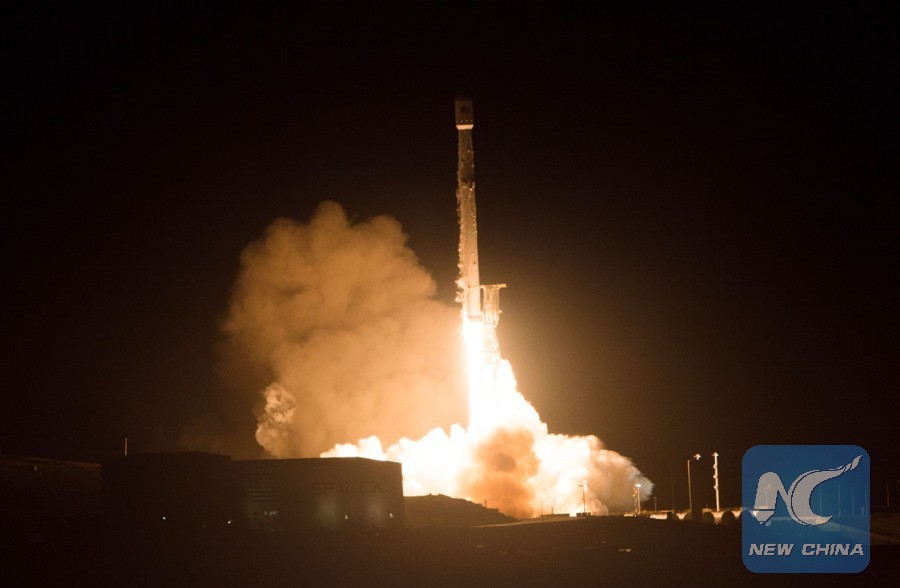File Photo: The SpaceX Falcon 9 rocket launches from the Space Launch Complex 4 at Vandenberg Air Force Base in Lompoc, California on December 22, 2017. (AFP Photo)
WASHINGTON, Jan. 9 (Xinhua) -- A highly classified U.S. spy satellite that was launched aboard a SpaceX rocket on Sunday reportedly failed to reach orbit and might have been lost, a SpaceX spokesperson said.
But SpaceX hinted that the presumed problem may have nothing to do with its rocket, the spokesperson in an emailed statement to Xinhua on Monday.
"We do not comment on missions of this nature; but as of right now reviews of the data indicate Falcon 9 performed nominally," the statement added.
Then, in an updated statement on Tuesday morning, SpaceX President Gwynne Shotwell reaffirmed that its Falcon 9 rocket "did everything correctly" during the launch from the Cape Canaveral Air Force Station in Florida.
"If we or others find otherwise based on further review, we will report it immediately. Information published that is contrary to this statement is categorically false," Shotwell said.
"Due to the classified nature of the payload, no further comment is possible," she said.
The mysterious Zuma satellite, built by American aerospace and defense technology company Northrop Grumman, failed to separate from the second stage of the Falcon 9 rocket and is assumed to have broken up or plunged into the sea, according to news website Time, which quoted two anonymous U.S. officials as saying.
The satellite is assumed to be "a write-off," the report said, adding that an investigation is under way, but there is no initial indication of sabotage or other interference.
However, Jonathan McDowell, an astronomer at the Harvard-Smithsonian Center for Astrophysics, tweeted that data from Space-Track, a website managed by the U.S. Strategic Command, indicated that Zuma "completed at least one orbit," which conflicted with media stories that payload failed to separate from the second stage.
He noted that it was "still possible that payload did not power up at separation, would account for at least part of [the] rumours of a failure."
"Normally when you buy a rocket launch, you've paid for 'the payload adapter on the rocket final stage pops the satellite off at the end,'" McDowell said, "but on this mission the customer provided its own payload adapter, so separation may be its problem and not SpaceX's problem."
The expert also refuted claims that the loss of Zuma is "a front, a cover to hide a successful insertion in a secret orbit or some other scam."
"This is JUST NOT PLAUSIBLE for many reasons. I am confident other experts on the subject will agree with me," he added.
Previously, SpaceX has launched two classified payloads for the U.S. government during the past year.
Launched in May, the NROL-76 spy satellite was for the National Reconnaissance Office. The other was a non-crewed X-37B space plane for the U.S. Air Force, which lifted off in September.
Shotwell said SpaceX anticipates no impact on the upcoming launch schedule.
"Falcon Heavy has been rolled out to launchpad LC-39A for a static fire later this week, to be followed shortly thereafter by its maiden flight," she said, adding that "We are also preparing for an [Falcon 9] launch for (Luxembourg-based) SES and the Luxembourg Government ... in three weeks."


